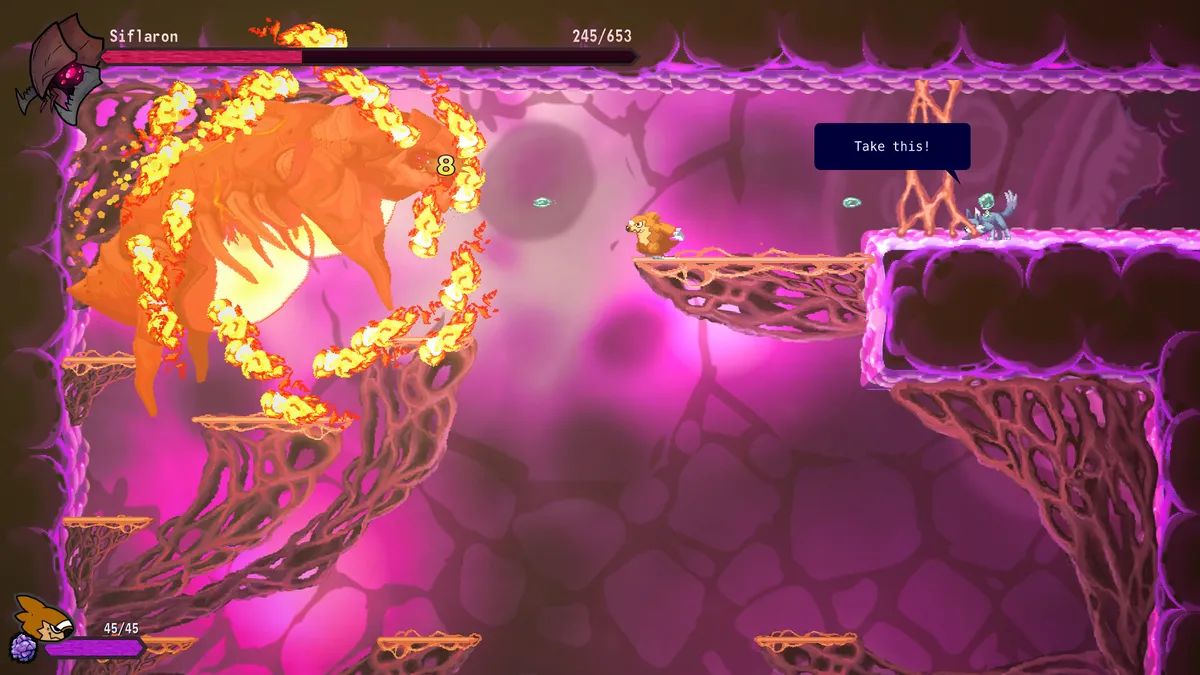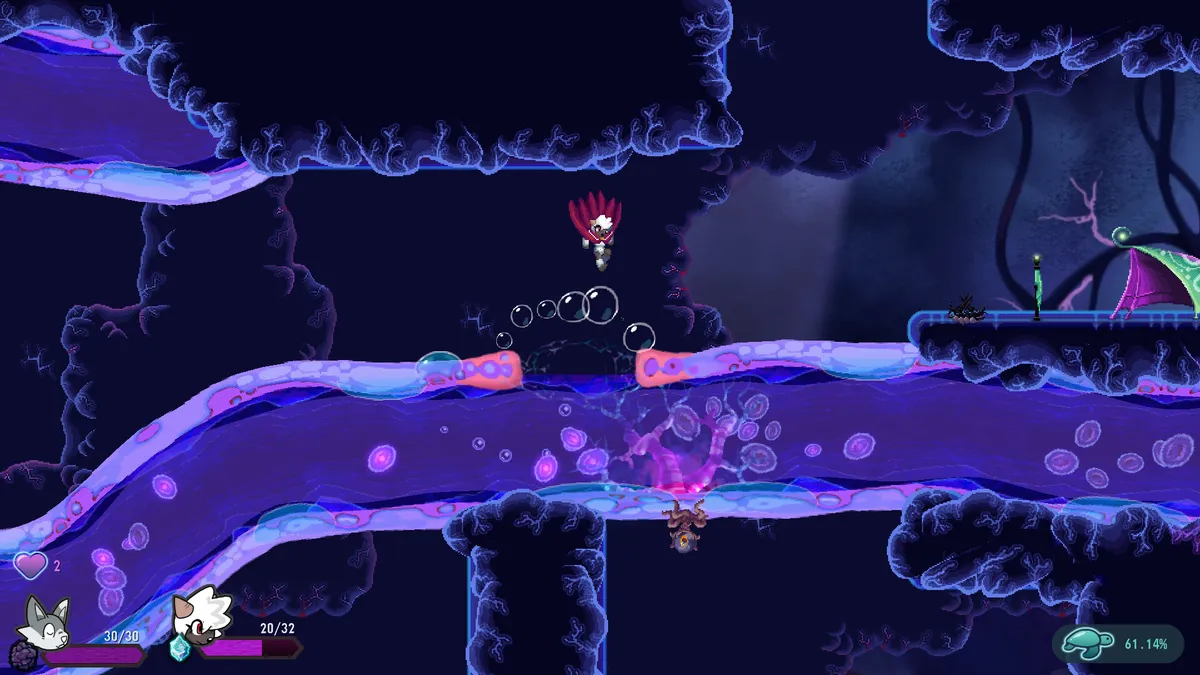Two things I appreciate about Moonlight Pulse

One, it's short. Its world isn't some massive interconnected maze, but a modestly sized space to explore. I love metroidvanias, but they easily can be bogged down by their sheer scope. Large worlds are fun to explore every now and then, but sometimes you need to keep it contained. Moonlight Pulse does this well. Its world, the body and insides of a massive turtle flying through space, does what I like from a good metroidvania. There's plenty of secrets to seek out and it's often just hands off enough to let you explore freely and get just a little lost. Best of all, it actually makes good use of the entirety of the space beyond simply making you backtrack for secrets. Every inch is used well, retreading old ground never a problem due to how easily you can get around.
I've said this elsewhere, but it's enriching when games make traveling back and forth through their worlds worthwhile. Fast travel is certainly a nice convenience, but it also feels like a failure of level design in some cases. It reveals how meaningless the majority of massive, sprawling worlds are when their size is circumvented via teleporting everywhere. What's the point of it all when it's so easily ignored, barely seen in passing the first time anyone moves through it? The metroidvania form is able to side-step that somewhat since it is, by design, a style of game built around mapping and understanding a space. Everything has to be carefully crafted because backtracking is an inherent aspect of the form. Doing that well is a challenge. It's easy for a game to make its world too big and full of busywork, movement too slow or just plain uninteresting, or make combat too much of a focus in a game where it shouldn't and thereby make revisiting rooms a chore.
Moonlight Pulse avoids those pitfalls on account of its scale. It's not a particularly large or long game – it took me several hours to basically do everything (I was only one point off 100%) – nor is it especially deep or complex. It just nails the fundamentals and maintains a tight scope. It doesn't overextend itself: it knows its strengths and plays to them.
(Quick aside: I love how Moonlight Pulse's fast travel system is integrated into the level design itself – you travel through the turtle's veins that you frequently see while traipsing about its body – instead of merely being a teleport. Love it when a game goes the extra mile to place mechanics in proper context within the world itself.)

Two, the multiple characters. Splitting all the abilities you earn to gain further access to the space between four characters who all play differently is a fun hook. Any one of them could serve as the sole star of a game and their ability set could be explored and expanded in plenty of ways and would make for great games. Placing them together as a crew who compliment each other's skills, however, requiring you to swap between them as needed suits the metroidvania form well. Instead of just accruing new abilities, you have another character to learn how to play.
And it's not just one or two things that differentiate them. They all have unique movement and approaches to combat. Silix is quick and evasive, able to wall jump and cover most angles with his claws. Laguna can attack from a distance and trap foes and objects alike in a bubble to move them around or create a bubble beneath him to bounce off enemies, and is the only one able to air dash and alter his trajectory in mid-air. Charlotte can glide using her cape and use her whip to climb, the whip also strongest when only the tip connects with its target. Clyde pilots a mech that can hover and create temporary platforms he can use to climb otherwise inaccessible tunnels, his flamethrower covering angles the rest of the cast can't easily hit.
Making every character have their own health bar is a good choice as well since it forces you to learn how to fight as everyone. You can’t really favor any one member of the team in combat as none of them are particularly hardy. Very easy to get knocked out if you aren’t careful.
It's especially smart because of how you start as the strongest combatant of the team, Silix, and have him for a while before he's absent till the late-game. Combat is frequent in Moonlight Pulse (and quick, thankfully) and Silix is very well-rounded. Where everyone else has specific angles they're able to cover or enemies they can't damage altogether, he can tackle just about everything. He’s one of the strongest and renowned curatives around and it shows. It lulls you into a sense of ease in the early game because you're strong and combat isn't really much of a concern. Just throw Silix at whatever's in your way and you'll be fine.
And then he's suddenly gone for most of the game.
It’s sort of a different take on the classic trope of games giving you your full ability set (or most of it) at the start briefly before taking it all away. Instead of a large suite of abilities, you’re combat capacity is reduced and some pathways through the world are now impassable. The rest of the cast are no slouches when it comes to fighting, but they do feel weaker by comparison. Laguna’s water projectiles don’t quite hit as hard as Silix’s claws. You can feel the difference in experience between them, how new Laguna is to this and how much harder he has to work compared to his peers.
The section following Silix’s removal is a clear illustration of this because of how immediately weakened you feel while exploring familiar ground. Laguna’s smaller hit-point pool and lower damage is strongly felt when forced to go solo. Not having an ally to fallback on, effectively limiting you to only a single life, paired with how stingy Moonlight Pulse can be with health recovery from fallen enemies (they don’t drop nearly as much as you’d want) makes the game feel more tense and difficult, even though you’re fighting the same foes as before, moving through spaces you’ve previously been through. It’s just long enough since the start of the game where you were in control of only one character that a return to that mode of play suddenly feels strange. It’s a short sequence, but a very effective one.